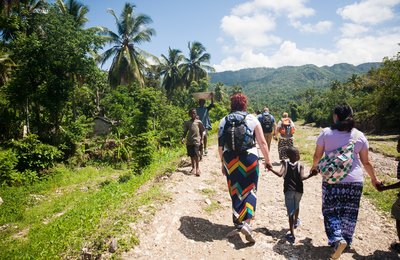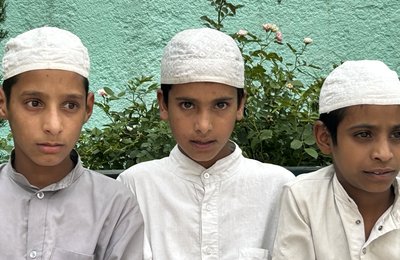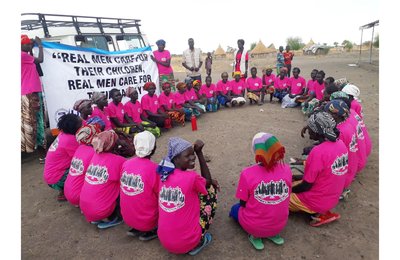Peace Under Pressure: Armenian and Azerbaijani Peace Activists
In the South Caucasus, peace initiatives that aim to bridge the divide between Armenian and Azerbaijani people have long struggled for public support. In Azerbaijan, the anti-war voices are often silenced by force, while in Armenia societal pressure prevents any lasting success.
There was a brief hope for peace in the aftermath of the 2020 war, but this was quickly dashed by the Azerbaijani military takeover of Nagorno-Karabakh in September 2023. The war, which lasted less than 24 hours, ended with a ceasefire agreement, the dissolution of the unrecognised Republic of Nagorno-Karabakh and the displacement of over 100,000 Karabakh Armenians to Armenia. This latest episode in a protracted conflict further fuelled the mutual hatred and political and social pressures that have long alienated the two nations.

"Not Embedded in Society"
"Achieving any results is going to be very, very difficult because most of us in this movement are not directly embedded in the societies," says Leon Aslanov, co-founder of Caucasus Talks – a grassroots platform for dialogue that initially addressed political, economic, and social issues in the South Caucasus. Leon, born and raised in the UK, maintains strong links with Armenia, where his parents are from. He adds that the platform also includes people living in the region who are sharing their ideas. "But none of us [edit.: the founders of peace initiatives living abroad] would want to put that burden on them and just say you do it there while we're safe here."
Since the clashes in July 2020 and the September war, the focus of Caucasus Talks has shifted. Despite considering it “politically useless,” Caucasus Talks issued a statement that went viral during the war, attracting more supporters. This widened the network but also highlighted the social pressure on peace activists: some had to hide their identity to avoid being targeted. Leon himself was mislabelled as an anti-government Azerbaijani during the 2020 war by Azerbaijani media.
Such incidents, however, were not a big deal for those that know how far it can go. The fear of crackdowns took many dissidents out of the region.[1]
"Choosing Between Visibility and Safety"
Sevinj Samadzade from the Feminist Peace Collective, working in conflict transformation for over a decade, notes that peace activists have been targeted as "traitors" and "agents" since the 1980s. This labelling makes them vulnerable to government crackdowns, pushing many to remain silent or work in safer environments. Visibility in peace activism, especially post-2020, often results in severe backlash. Sevinj recalls the Feminist Peace Collective facing intense criticism for showing solidarity with Karabakh Armenians during a blockade.
"We Don’t Acknowledge How Heavy the Trauma Is"
Even if peace initiatives had a bigger presence in the region, Leon remains sceptical about their political power. He believes the peace process was always going to be “government-led,” saying that the September 2023 events did not change much. Ongoing security concerns, demands for new territories, and uncertainties around border delimitation complicate bilateral relations further. Leon notes that people’s perceptions of these processes depend on many factors, such as age, geography, or personal experiences.
The political and military processes leading to the de facto resolution of the Nagorno-Karabakh conflict by its recapture by Azerbaijan and the displacement of the region’s Armenian population changed the dynamics of the peace process. While the status of Nagorno-Karabakh was resolved, it brought trauma to yet another generation, leaving the fate of the former Armenian residents bleak.
Rauf Mammadov, is a member of Bright Garden Voices, which aims to provide a platform for alternative views and coexistence, focusing on the human factor and interaction. Currently based in the United States, Rauf is sceptical about the future of the region and the impact of peacebuilding platforms.
Rauf believes top-down solutions are more effective in the South Caucasus, and that any peace agreement between the countries can positively impact the process. However, Rauf sees no positive outcome in Azerbaijan’s resolution of the Nagorno-Karabakh conflict, which he believes has increased existing grievances. He doubts small-scale grassroots efforts will have an immediate or significant impact on the peace process.
An Uncertain Future
The ongoing political processes will shape the region’s reality and the direction of peace initiatives. Activists agree that currently, peace activists are in “echo chambers” where everyone knows everyone, and new faces appear infrequently. Sevinj believes the new generation that emerged after the 2020 war replaced one “bubble of people” with another, sharing the main principles of peace.
“It's a real concern to get out of that echo chamber,” Rauf says. “It's a challenge to amplify our outreach and reach the majority of people that matter.” Despite being public about his peace activism, Rauf can be reluctant to open discussions on such sensitive topics with fellow Azerbaijanis. “It's very difficult to start a conversation with people who have lost someone in the war.”
Bright Garden Voices plans to use Russian-language content for the older generation and platforms like TikTok for younger audiences. Most members and new joiners are in their early 20s. “What shocks me is that these people don't have any experience with living with Azerbaijanis or first-hand experience of the first war like me.”
Yet, new voices are still a minority.
For that, activists need funding, a safe environment, and an encouraging political process that is currently lacking.
[1] The latest round of the crackdown on dissent in Azerbaijan took place in early September 2024, marked by the arrest of prominent peace activist and political scientist Bahruz Samadov. Several other activists were detained in order to force them to testify against Bahruz.






